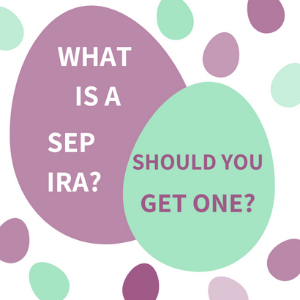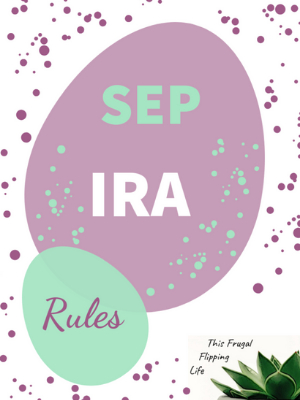What is a SEP IRA and what are the rules for getting one?
In today’s post we’ll look at what exactly a Simplified Employee Pension Individual Retirement Account (SEP IRA) can do for you, if you qualify according to the eligibility rules, and whether or not it’s right for you to consider. Keep reading to find out how this awesome option might work with your business.

Just recently, because it’s tax time and I was desperate, I re-discovered the magic that is a SEP IRA account. I found out I was going to owe a lot of taxes this year. Cue the crying. But my awesome CPA recommended I consider opening one of these accounts to decrease the tax burden.
I’d heard of these before but wasn’t too clear on the SEP IRA rules. So I’d sort of just pushed it into the “general finance knowledge” section of my mind, you know, near the back. But once I started looking into it on NerdWallet, I realized this is an incredibly helpful investment vehicle if you’re eligible. So, today I’m sharing the SEP IRA rules with you, in the hopes that maybe you’ll find it useful as well.
What Is A SEP IRA
First, an IRA in general is a retirement account for yourself. That’s what the letters mean, “Individual Retirement Account”. There are a few different kinds but basically they all hold money (either before or after taxes) and grow interest so that you can take it out during your retirement.
If you’re like me and have worked in the corporate world most of your life, your employer probably provides your retirement account and helps contribute to it like a 401k.
Since I’m transitioning into self-employment, no one else provides that anymore. I have to do it all myself! Which is where the IRA comes in, and specifically, because I am the owner of my business, a SEP IRA.
Why Use A SEP IRA?
SEP stands for Simplified Employee Pension. As you can guess from the name, it is a simple version of the IRA. Designed for small businesses, the SEP IRA provides a basic retirement account to which the employer can contribute.
Because I’m a business of one, this is perfect for me since I am both the employer and the employee. It also allows for variable contributions year to year, which is another win for me since my income fluctuates.
Other Posts related to Finance and Investing:
- How to Reach Financial Independence and Retire Early
- Micro Investing for Beginners
- Make A Budget from Scratch
What’s the Difference Between a SEP IRA vs. a Traditional IRA?
The major difference here is how the accounts can be funded. Individual employees can contribute to the traditional IRA as well as the employer, however only the employer (or the “self” of the self-employed) can fund a SEP IRA.
The maximum allowed contributions are also different. $6,000 is the current cap in 2020 and 2021 for a traditional IRA. SEP IRAs allow you to contribute either 25% of the employee’s total compensation or up to $58,000, whichever is less.
Note: pre-tax money funds these accounts. This means you can contribute some of your income during the year, and then that income is not counted on your annual taxes. The money grows over the years as what’s considered to be “tax-free”.
But when it’s time to take it out, you’ll need to pay those deferred taxes. It’s taxed as just more of your regular income for the year you take the withdrawal.
So, if you decide to take out say, $50,000 and you also made $50,000 that year, you would be taxed as if you made $100,000. However, most people assume they will need much less income during their retiring years, which will result in a lower tax bracket overall.
SEP IRA Eligibility Rules
Okay, so in a nutshell here’s the breakdown of the SEP IRA rules:
- Contributions must come from employer
- Employer must contribute equal percentage to all employees
- Can contribute in a year the lesser of 25% of employee’s compensation or $56,000
- Contributions can fluctuate year to year, even skip years
- Employees must be over 21 years old to be eligible for contributions, and have been compensated at least $500
- Contributions are pre-tax, withdrawals are taxed as income

Best IRA for Self-Employed and/or Freelancers
If you’re lucky enough to consider yourself either a freelancer or are self employed with your own business, the SEP IRA is a fantastic retirement account option. Your bank or a financial advisor can easily set one up for you. I recommend you check out your local credit union as they often have low fees and low minimum balance requirements too.
If you aren’t ready or able to start up this kind of an account, you can still grow your money even if you are starting out really small. Check out this post on Micro Investing For Beginners and learn about why you want to do more with your money than just leaving it in a savings account.
*Below is an affiliate link which means if you click on it I may receive compensation at no cost to you.*
Should You Get A SEP IRA?
In the end, only you can decide if opening a SEP IRA is best for you and your finances. But I hope this helped provide you with some information to get you a little closer to deciding that. Let me know what you think in the comments and if you have any questions I’ll try to answer them. Happy investing!

Related Articles in Money and Savings:
- Beat Frugal Fatigue and Reach Your Financial Goals
- Reduce Your Monthly Food Expenses
- Save Money and Be More Eco-Friendly

Thanks, it’s very informative